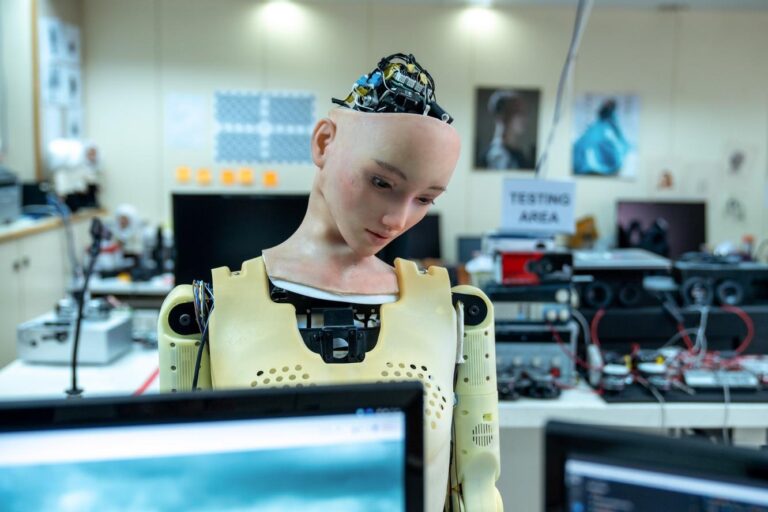Photo credit: Stringer/Anadolu Agency
Recently, a concerned college graduate asked me if there are any jobs that AI can’t replace. I understood his concern, but realized the question needed a bit of fine-tuning. Instead of asking about specific jobs, it would be more useful to identify industry-wide functions that AI can’t perform.
AI’s dominance seems almost unfounded. According to the World Economic Forum’s latest Future of Jobs Report, 50% of organizations expect AI to drive job growth. That said, the most competitive professionals of the future will be those with uniquely human skills that AI can’t replicate. Here are some of those skills and how they can be applied.
Offer empathy
When we think of jobs that require empathy, therapists and social workers are the first to come to mind. But in fact, empathy is an important trait in many professions. I remember a professor from my college days who quietly listened to our frustrations when we couldn’t solve a problem. I also remember a nurse who helped one of my sons to no longer be afraid of receiving injections.
Empathetic people are a source of comfort and reassurance that AI-powered tools can’t replace. One study explored how people felt “heard” after receiving responses from an AI or a human. Researchers found that initially people felt more heard with the AI-generated message, suggesting that AI can provide emotional support. However, once participants realized the response was generated by an AI, they felt less heard, suggesting that they seek emotional support from humans above all else.
It’s fair to say that roles that require a high level of empathy will not be immune to AI.
Engage in complex negotiations
In 2021, Walmart Canada began using AI-powered tools to negotiate contracts with many of its 100,000 suppliers. This raised alarm bells that AI would take over business and legal negotiations, but Martin Lund, CEO and co-founder of Pactum, which led Walmart Canada’s implementation of AI-based negotiations, told Forbes: “We’re not replacing human employees, but rather eliminating the monotonous, low-input aspects of a procurement executive’s job, freeing up time for strategic negotiations.”
AI can handle simple negotiations over boilerplate contracts. Humans are still needed to determine constraints and acceptable terms, and to review the completed negotiation. But advanced, dynamic negotiation processes remain safely within the purview of humans. This could include real estate agents, lawyers, event planners, sales executives, project managers, etc.
Creativity and Creative Direction
Wharton professor Christian Terwiesch advocates using ChatGPT for idea generation.
“It’s cheap. It’s fast. It’s good. What’s not to like? The worst case scenario is that you reject all the ideas and run with your own. But our research strongly points to the fact that it enriches the idea pool,” Terwiesch said.
ChatGPT and other LLMs are great resources for brainstorming, whether you want to come up with a catchy headline or find a profitable startup idea, but at the end of the day, humans have the unique ability to do meaningful creative work and make the final decisions about that work.
An AI might be able to imitate Dostoyevsky’s voice, but it can’t write Crime and Punishment. It might be able to write songs based on music theory, but it can’t independently create the eerie music that made Jaws so terrifying.
It’s a matter of preference, experiential expertise and perspective – something that AI can’t replicate.
Lead (other human being)
AI is objective. It doesn’t favor people. It can quickly synthesize large amounts of information and make data-driven predictions. It could be said that AI has leadership qualities. But when employees need guidance, motivation, and inspiration, human leaders will always have the edge.
In a survey of more than 600 employees across multiple industries, researchers found that humans prefer to be guided by other humans, despite their flaws and messiness. A majority of those surveyed said they don’t have much trust in AI’s ability to understand human behavior in the workplace. 69% were concerned or strongly agreed that AI would be used to make decisions about hiring, promotions and work assignments.
AI may be able to perform certain tasks typical of a leader, but ultimately, people want others to provide leadership.
Final thoughts
Once you understand which job functions AI tools cannot perform, the best way to prepare for the workplace of the future is to continue developing the relevant skills.
In roles that require empathy, practice active listening, patience, and questioning your assumptions. In negotiations, focus on learning how to create value. To become more creative, consume as much creative material as possible. And to be a better leader, strive to cultivate the most authentic version of your leadership style. Think about leading in a way that reflects your values and vision. And to work more effectively with your colleagues, strive to know and understand them.
Professionals who are equipped with these and other human-centric skills will be in the best position to future-proof their careers.


